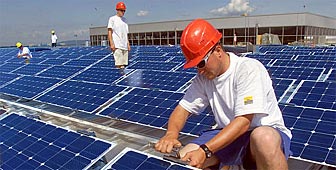
Swiss turn down new levy on energy resources

The Swiss people on Sunday rejected three initiatives which proposed raising a levy on the use of non-renewable energy sources. The government expressed disappointment at the outcome.
The first measure, known as the Solar Initiative, was rejected by nearly 68 per cent of the population, while the two other related initiatives were also turned down, but by lesser margins.
Speaking for the cabinet, the energy minister, Moritz Leuenberger, said the results were a setback for the government’s energy policies.
Leuenberger said the proposed ecological tax reform – which required the acceptance of one of the initiatives – would now have to be forgotten for a long time.
There was mixed political reaction to the results. The centre-right Radical Party said it was pleased its recommendations to reject all three initiatives had been followed.
But a Social Democrat spokeswoman said Switzerland had missed an opportunity to move away from its dependence on nuclear energy and petrol.
The Solar Initiative had proposed a constitutional change to introduce a tax surcharge on non-renewable energy, such as nuclear power, gas and petroleum.
It envisaged a levy on energy bills of SFr0.01 rising to SFr0.05 per kilowatt-hour within the first five years. This was expected to raise about SFr750 million annually over 25 years.
The revenue would have been used to promote more economical energy consumption and alternative energy sources. According to the proposal, at least half of the money raised would go towards encouraging the use of solar energy.
The two other proposals differed on the size of the tax and how the proceeds would be used.
A counter-proposal to the Solar Initiative, put forward by parliament and the government, envisaged a surcharge of SFr0.03 per kilowatt-hour on non-renewable energy over a period of 10 to 15 years.
The proceeds, estimated at about SFr450 million annually, would have been used to promote all renewable forms of energy, especially hydroelectric plants.
A third proposal, backed by parliament and government, would have introduced a maximum surcharge of SFr0.2 per kilowatt-hour. If it had been adopted, it was expected to have resulted in SFr3 billion in revenues per year.
Under the proposal, the revenue would have been returned to individuals and businesses, with the funds then used for social insurance.
In another vote on Sunday, the people of canton Berne rejected by a 2-1 majority a proposal to shut down the Muhleberg nuclear power plant in 2002.
swissinfo with agencies

In compliance with the JTI standards
More: SWI swissinfo.ch certified by the Journalism Trust Initiative




































You can find an overview of ongoing debates with our journalists here . Please join us!
If you want to start a conversation about a topic raised in this article or want to report factual errors, email us at english@swissinfo.ch.